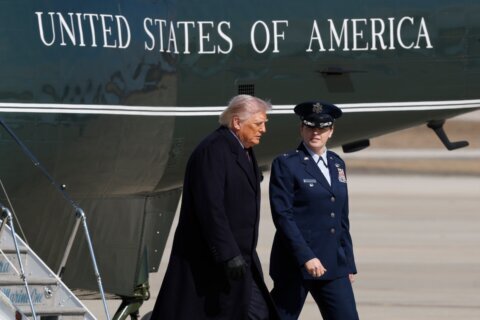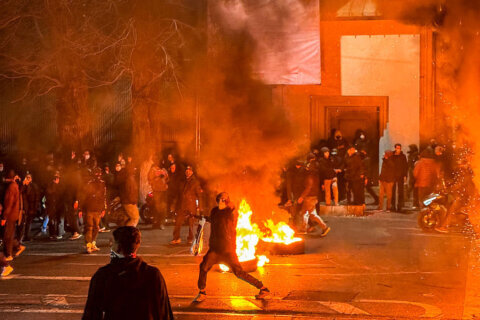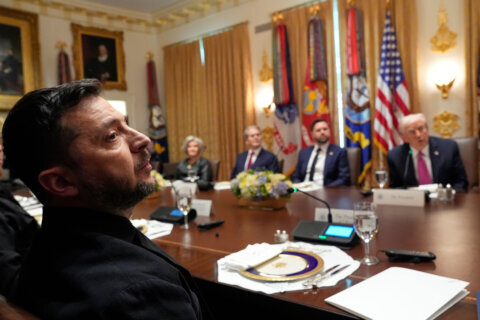This is Part Two of a two-part series by WTOP’s National Security Correspondent J.J. Green, following the disinformation spread in American politics. Read Part One.
This video is no longer available.
When the FBI and Homeland Security officials alerted the nation in January that Russian actors would try to manipulate the 2024 election, they weren’t sure at the time how the Russians would do it. But, oddly, a short time later, as news of an illness in Britain’s royal family emerged, the Kremlin’s plot came into focus, and its U.S. intentions were exposed.
In March, when Kate, Princess of Wales, mysteriously dropped out of sight, internet sites and social media exploded with wild speculation about the cause of her disappearance. She later revealed a cancer diagnosis.
But in the interim, millions of posts, memes and online theories spread, exhibiting patterns that disinformation experts immediately recognized.
“These patterns of behavior were consistent with a Russian information operation that, in the open-source community, is referred to as ‘Doppelganger,’” said professor Martin Innes, director of the Security, Crime and Intelligence Innovation Institute at Cardiff University in Britain.
“Doppelganger,” according to Innes, “was leaping on the conspiracies about the Princess of Wales and amplifying them and nudging their visibility forward.”
But the operators weren’t just amplifying the social media noise: They were changing the subject, which is the primary mechanism that makes schemes like Doppelganger work.
The purveyors join popular conversations online, befriend and commiserate with those posting, and then begin pushing their own agenda.
“Rather than responding and talking about the Princess of Wales, they were actually talking about the war in Ukraine, or the elections that had been happening in Russia,” said Innes.
He and other experts and organizations that monitor Russian disinformation operations soon discovered that Doppelganger was ramping up in the U.S. as well.
The sophisticated ruse had begun to show up online on sites that mimicked trusted U.S. media sites.
According to Bret Schafer, a senior fellow at the Alliance for Securing Democracy at the German Marshall Fund, they were doing something called “laundering propaganda.”
Doppelganger created fake news sites identical to real ones
Information launderers have the same problem as money launderers ─ finding a way to make their commodities appear to come from legitimate sources.
“It’s easy enough to come up with a narrative, but it’s hard to get that narrative into an outlet that is credible, that your target audience actually watches and believes in,” Schafer said.
True to the meaning of the name “Doppelganger,” those running the U.S. operation started creating fake news sites, many of which were almost identical to authentic American sites.
But they weren’t alone.
Clint Watts, general manager for Microsoft’s Threat Analysis Center, said a different Russian disinformation operation called “STORM 1516″ grabbed the company’s attention almost immediately, especially when they began posting content to discredit President Joe Biden’s reelection campaign.
“We reported on them earlier in the year creating videos which allege to be from big whistleblowers who are trying to tell some sort of information about the election. At that time, it was about largely President Biden,” Watts said.
American intelligence and law enforcement authorities were on to both operations, and on Sept. 4, responded with a massive, multitiered effort to shut down the operations.
The Justice Department seized 32 internet domains used in connection with “Doppelganger,” in violation of U.S. money laundering and criminal trademark laws.
According to the Justice Department, those domains covertly spread Russian propaganda with the aim of reducing international support for Ukraine, bolstering pro-Russian policies and interests and influencing voters in U.S. and foreign elections, including the 2024 presidential election.
The U.S. Treasury Department sanctioned 10 individuals and two entities involved in the “Doppelganger Campaign.” The Treasury’s sanctions were part of a broader effort to curb foreign interference in U.S. elections.
Additionally, the State Department applied the Foreign Missions Act to the state-funded news station RT (formerly known as Russia Today) and its subsidiaries, requiring them to register as foreign entities in the U.S.
A grand jury in Maryland also charged six computer hackers, all of whom were residents and nationals of the Russian Federation, with conspiracy to commit computer intrusion and wire fraud conspiracy in September.
Even though the Kremlin’s disinformation campaigns have been focused on the 2024 presidential election, it may take weeks or months to determine their significance.
Virginia Sen. Mark Warner told WTOP that progress has been made in fighting disinformation, but challenges remain.
“There’s the willingness of Americans to believe crazy theories just because they read it on the internet. We even see presidential candidates spouting off crazy theories that have no basis in fact, we’ve got artificial intelligence tools that can be used as deepfakes and manipulating images and voices,” Warner said.
He warned voters to be vigilant and to check and recheck anything they hear or see regarding voting in their communities to be sure it’s not disinformation.
“I am enormously concerned and I feel like the level of public attention to this issue has dissipated a little bit,” said Warner.
Get breaking news and daily headlines delivered to your email inbox by signing up here.
© 2024 WTOP. All Rights Reserved. This website is not intended for users located within the European Economic Area.








